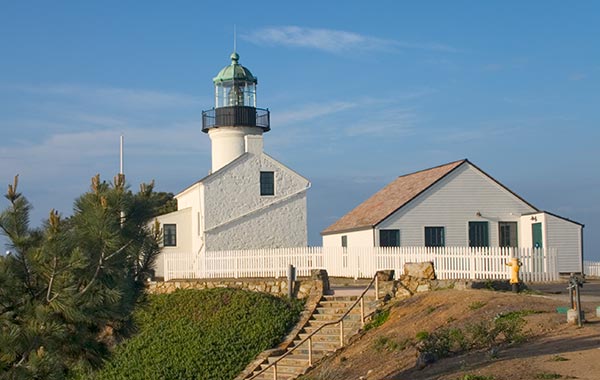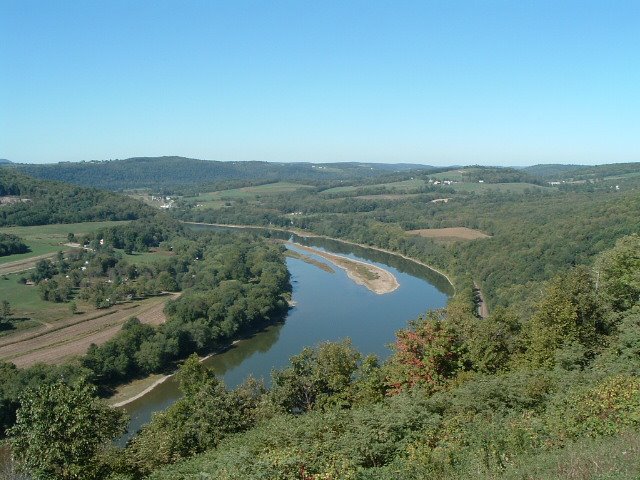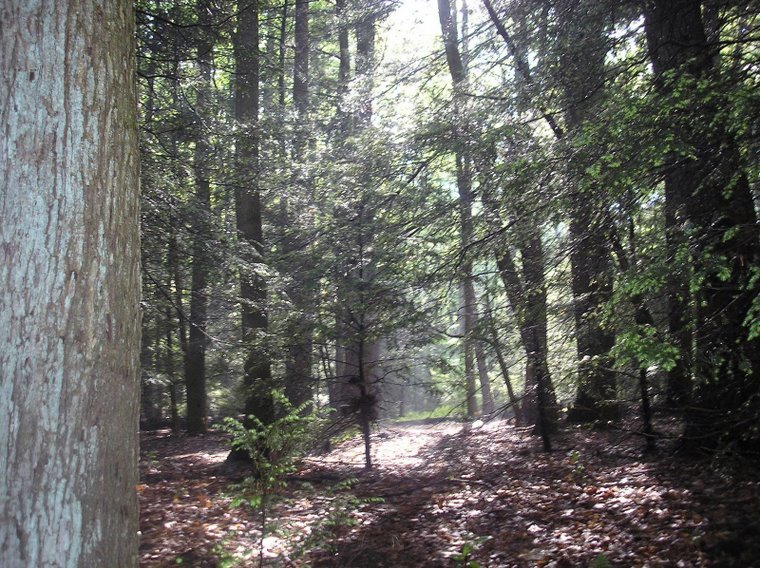
Excerpts from the short story “Fishing with my son”
Joseph Manduke
Spring 2008
That summer of 1965 we packed up most of the pets, my above-mentioned cousin Dave (who was a pure city boy) and we wound our way to the place on dad’s fishing map was labeled “Wild River”, near Towanda, and a place then called Wyalusing Rocks in Bradford County.
It was late June, school out, and very balmy. The area where the river flowed was farmland. Once, Marie Antoinette had been scheduled to relocate here to avoid the issues of the French Revolution. She didn’t make it, but plenty of other French settled here, including one Charles Homet. He is important here as we asked a local farmer, an ancient Mr. Smith with a still out back where we might rent a summer cabin and maybe a rowboat. Well he happened to have a tiny yellow cabin with a big antique wooden radio and a wood-burning stove at the old Homet’s Ferry crossing.
The back road ended there at the river, but the road obviously continued along the other side. So while my mom and sister painted the mountains, round-pebbled beaches we would, my cousin, dad, and I fish the river.
The river was swift and clean with 2 islands just above the old ferry road. Downstream, the river turned sharply east, moved by an ancient Appalachian mountain I have come to call Joe’s mountain, for all the Joe’s of this tale.
My cousin Dave was a skinny, blond boy of 12. This was his first trip to the country and he was staying close to dad, his own father driven off by his greedy and downright nasty mother. I had rowed the little aluminum boat that went with our cabin out and shoved the bow onto an island.
Moments later, in the late morning sunlight, I heard my cousin yell in a nasal, shrill voice “Uncle Joe! Uncle Joe! A muskellunge-the first I had ever seen had taken Dave’s red and white Daredevil spoon and rocketed straight out of the river not 30 feet from me It dwarfed tiny Dave, shaking its head to disgorge the dangling spoon, its dark vertical bars on a greenish background. I had never seen a fish that large. One splash, silent, line broken.
From that day forward, even at that time with 5 years of fishing under my little belt, I was a fisherman. And this spot at Homet’s Ferry is a sacred place of real spirits, ghosts of dad and that fish, that summer of fresh wood-stove cooked walleyes, the smell of manure from the dairy farm, and the smell of a clean, fished filled rural paradise.
We also drove around the area in our green and white rambler wagon looking for other fishing spots. We left the ladies to drive to Terrytown on the other side of the river. The fishing map did show roads along the river course there. We found a spot with a steep bank and caught an almost incredible number and variety of fish. Mostly on the small side, bass, pike, and walleyes, a member of the perch family. We had dinner for sure. Mom would clean, roll in cornmeal and fry them up in nice smelly bacon fat. Imagine these days living thru that to tell about it.
We were getting ready to leave Terrytown to cross back to the cabin when someone drove by in an old truck and yelled. I didn’t hear it, still elated with our catch, but dad said “short pants”. Dad usually wore shorts fishing on warm summer days. Apparently this was a taboo in Appalachia, and the two farmers in the pick up had yelled, “faxxot, short pants “, at dad. This was unwise of them. Very calmly, saying nothing dad took off with Dave and me in the Rambler. He reached under the seat and pulled out a metal hand axe that we used for camp wood, at least we had. Dad, driving madly in the passing lane, left hand draped on the wheel, his right chopping with the axe yelled, “you lousy bastards, I am gonna hack your f’ing faces to bits”. There was abject terror on the farmer’s faces, who went off the road into the ditch. My heart was pounding. Dad put his axe away quietly and we calmly went back to the Homet Ferry cabin and ate a fish dinner.
Another odd thing occurred that trip. My mom’s parakeet “Peekie” had developed some sort of a bird “cold”. Mom sent me to the chicken farm up the hill from the river with two missions, buy a little fresh vegetable to go with our pike and see if they had any bird medicine. Peekie had been an important part of my life as long as I remembered. I would feed him bits of egg and bread at breakfast in the morning, and he would cheerily chirp. Well on approaching the farm I saw a very gaunt elderly man stiffly standing with a rusty hoe. He was wearing striped bib overalls and a cap, like a painting. He was tending yellow wax beans. I asked him how much for the beans, and he gave me a big paper sack full of fresh yellow wax beans for a quarter. Quarters were silver then. As for medicine, he gave me a small bag of red powder and said follow the instructions. He seemed overjoyed to talk with a young person on the subjects of birds and beans. Well our parakeet survived many more years along with my dog Ticky and our cats Mildred and Herman, the other pets that came with us on that trip to the little yellow cabin.
There are three surviving watercolors my mom painted on that trip. One is of the fishing spot at the ferry crossing-near the axe incident. The other is the Homet Ferry store, which still stands but is no longer a store, a short walk from the old cabin. Mom painted another watercolor of me and my sister sitting along route 6 at the Wyalusing Rocks overlook. The river and islands are seen down below in the summer-green valley mists. The distant view of the islands and watercourse where I have fished, canoed, and camped for nearly 40 years still looks the same. There are photos of nearly everyone important in my life sitting in one of the stone gazebos, contemplating the valley below.
The old route 6 cart way is the driveway now, soon to be near a Delaware Nations Nature/interpretive center. I have volunteered to be the geologic/environmental consultant for the project. How my close friends and family react to the beauty of the river valley here, and the nostalgia of Yellow Breeches, speaks of their character.
These are the places that define who I am. If I do go back this spring, it will be with my son and daughter if she wishes.
So I will play with my kids in the sun, God willing when I leave my now nice little place here on the island. But it’s a loveless place, too far from that set of memories. Lifetime grows short and I have to make peace with my infinite truths, introduce the children to them, and decide where I will be. I can only hope that our memories will forge the desires and meanings my family has given me. Time is so short-so much wasted on sad discord, useless empty dreams and greed of them. Take me and mine to where the fishes leap and the osprey flies, and I can today in the summer, wear shorts along the Susquehanna.
Copyright 2008 Joseph Manduke All Rights Reserved
Joseph Manduke
Spring 2008
That summer of 1965 we packed up most of the pets, my above-mentioned cousin Dave (who was a pure city boy) and we wound our way to the place on dad’s fishing map was labeled “Wild River”, near Towanda, and a place then called Wyalusing Rocks in Bradford County.
It was late June, school out, and very balmy. The area where the river flowed was farmland. Once, Marie Antoinette had been scheduled to relocate here to avoid the issues of the French Revolution. She didn’t make it, but plenty of other French settled here, including one Charles Homet. He is important here as we asked a local farmer, an ancient Mr. Smith with a still out back where we might rent a summer cabin and maybe a rowboat. Well he happened to have a tiny yellow cabin with a big antique wooden radio and a wood-burning stove at the old Homet’s Ferry crossing.
The back road ended there at the river, but the road obviously continued along the other side. So while my mom and sister painted the mountains, round-pebbled beaches we would, my cousin, dad, and I fish the river.
The river was swift and clean with 2 islands just above the old ferry road. Downstream, the river turned sharply east, moved by an ancient Appalachian mountain I have come to call Joe’s mountain, for all the Joe’s of this tale.
My cousin Dave was a skinny, blond boy of 12. This was his first trip to the country and he was staying close to dad, his own father driven off by his greedy and downright nasty mother. I had rowed the little aluminum boat that went with our cabin out and shoved the bow onto an island.
Moments later, in the late morning sunlight, I heard my cousin yell in a nasal, shrill voice “Uncle Joe! Uncle Joe! A muskellunge-the first I had ever seen had taken Dave’s red and white Daredevil spoon and rocketed straight out of the river not 30 feet from me It dwarfed tiny Dave, shaking its head to disgorge the dangling spoon, its dark vertical bars on a greenish background. I had never seen a fish that large. One splash, silent, line broken.
From that day forward, even at that time with 5 years of fishing under my little belt, I was a fisherman. And this spot at Homet’s Ferry is a sacred place of real spirits, ghosts of dad and that fish, that summer of fresh wood-stove cooked walleyes, the smell of manure from the dairy farm, and the smell of a clean, fished filled rural paradise.
We also drove around the area in our green and white rambler wagon looking for other fishing spots. We left the ladies to drive to Terrytown on the other side of the river. The fishing map did show roads along the river course there. We found a spot with a steep bank and caught an almost incredible number and variety of fish. Mostly on the small side, bass, pike, and walleyes, a member of the perch family. We had dinner for sure. Mom would clean, roll in cornmeal and fry them up in nice smelly bacon fat. Imagine these days living thru that to tell about it.
We were getting ready to leave Terrytown to cross back to the cabin when someone drove by in an old truck and yelled. I didn’t hear it, still elated with our catch, but dad said “short pants”. Dad usually wore shorts fishing on warm summer days. Apparently this was a taboo in Appalachia, and the two farmers in the pick up had yelled, “faxxot, short pants “, at dad. This was unwise of them. Very calmly, saying nothing dad took off with Dave and me in the Rambler. He reached under the seat and pulled out a metal hand axe that we used for camp wood, at least we had. Dad, driving madly in the passing lane, left hand draped on the wheel, his right chopping with the axe yelled, “you lousy bastards, I am gonna hack your f’ing faces to bits”. There was abject terror on the farmer’s faces, who went off the road into the ditch. My heart was pounding. Dad put his axe away quietly and we calmly went back to the Homet Ferry cabin and ate a fish dinner.
Another odd thing occurred that trip. My mom’s parakeet “Peekie” had developed some sort of a bird “cold”. Mom sent me to the chicken farm up the hill from the river with two missions, buy a little fresh vegetable to go with our pike and see if they had any bird medicine. Peekie had been an important part of my life as long as I remembered. I would feed him bits of egg and bread at breakfast in the morning, and he would cheerily chirp. Well on approaching the farm I saw a very gaunt elderly man stiffly standing with a rusty hoe. He was wearing striped bib overalls and a cap, like a painting. He was tending yellow wax beans. I asked him how much for the beans, and he gave me a big paper sack full of fresh yellow wax beans for a quarter. Quarters were silver then. As for medicine, he gave me a small bag of red powder and said follow the instructions. He seemed overjoyed to talk with a young person on the subjects of birds and beans. Well our parakeet survived many more years along with my dog Ticky and our cats Mildred and Herman, the other pets that came with us on that trip to the little yellow cabin.
There are three surviving watercolors my mom painted on that trip. One is of the fishing spot at the ferry crossing-near the axe incident. The other is the Homet Ferry store, which still stands but is no longer a store, a short walk from the old cabin. Mom painted another watercolor of me and my sister sitting along route 6 at the Wyalusing Rocks overlook. The river and islands are seen down below in the summer-green valley mists. The distant view of the islands and watercourse where I have fished, canoed, and camped for nearly 40 years still looks the same. There are photos of nearly everyone important in my life sitting in one of the stone gazebos, contemplating the valley below.
The old route 6 cart way is the driveway now, soon to be near a Delaware Nations Nature/interpretive center. I have volunteered to be the geologic/environmental consultant for the project. How my close friends and family react to the beauty of the river valley here, and the nostalgia of Yellow Breeches, speaks of their character.
These are the places that define who I am. If I do go back this spring, it will be with my son and daughter if she wishes.
So I will play with my kids in the sun, God willing when I leave my now nice little place here on the island. But it’s a loveless place, too far from that set of memories. Lifetime grows short and I have to make peace with my infinite truths, introduce the children to them, and decide where I will be. I can only hope that our memories will forge the desires and meanings my family has given me. Time is so short-so much wasted on sad discord, useless empty dreams and greed of them. Take me and mine to where the fishes leap and the osprey flies, and I can today in the summer, wear shorts along the Susquehanna.
Copyright 2008 Joseph Manduke All Rights Reserved




























